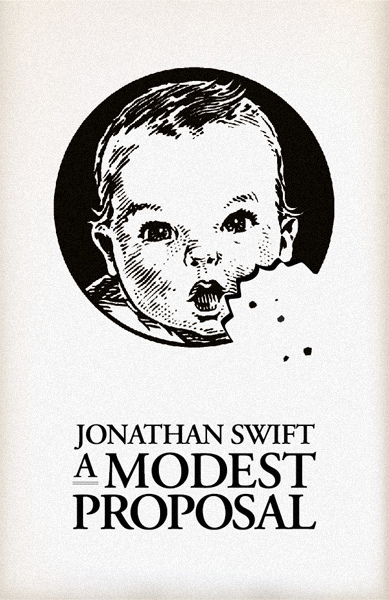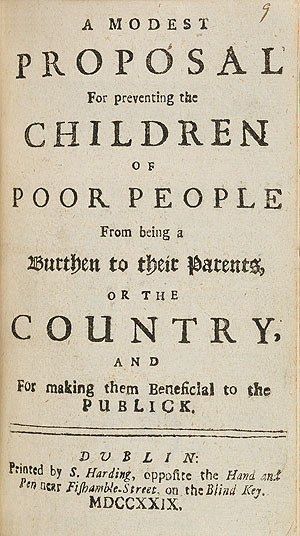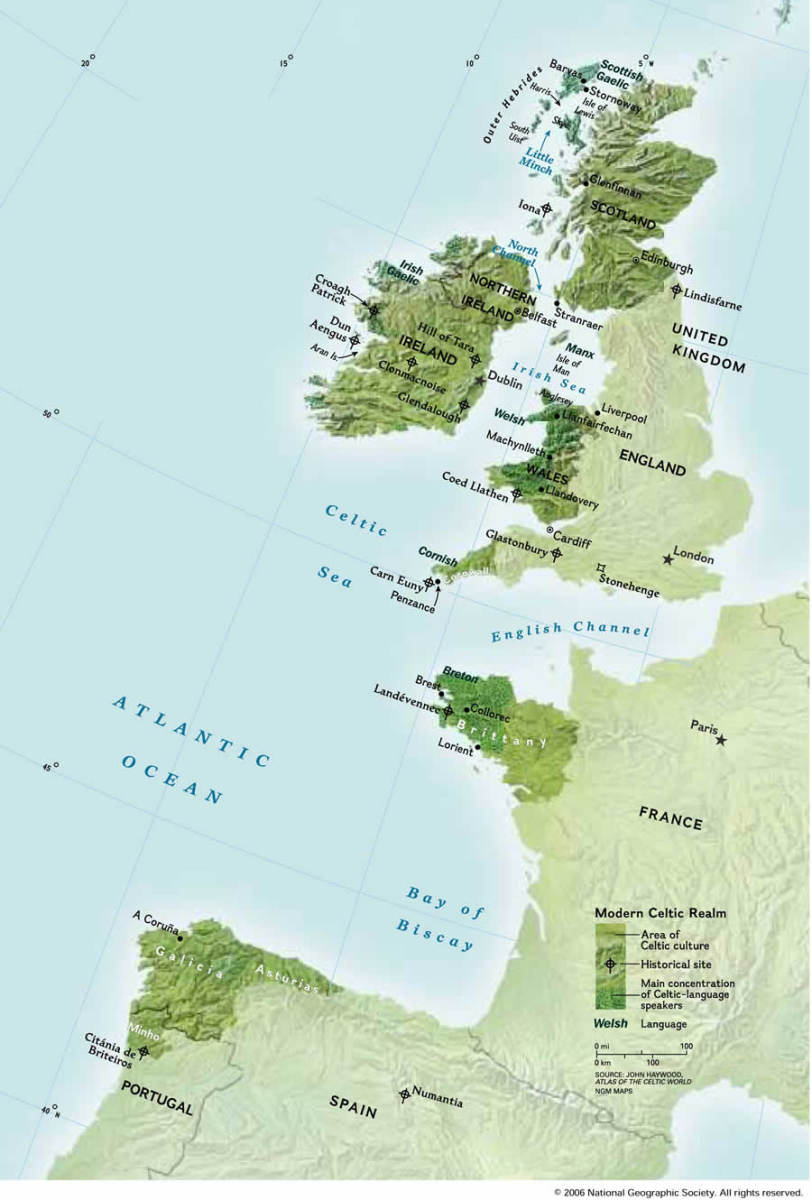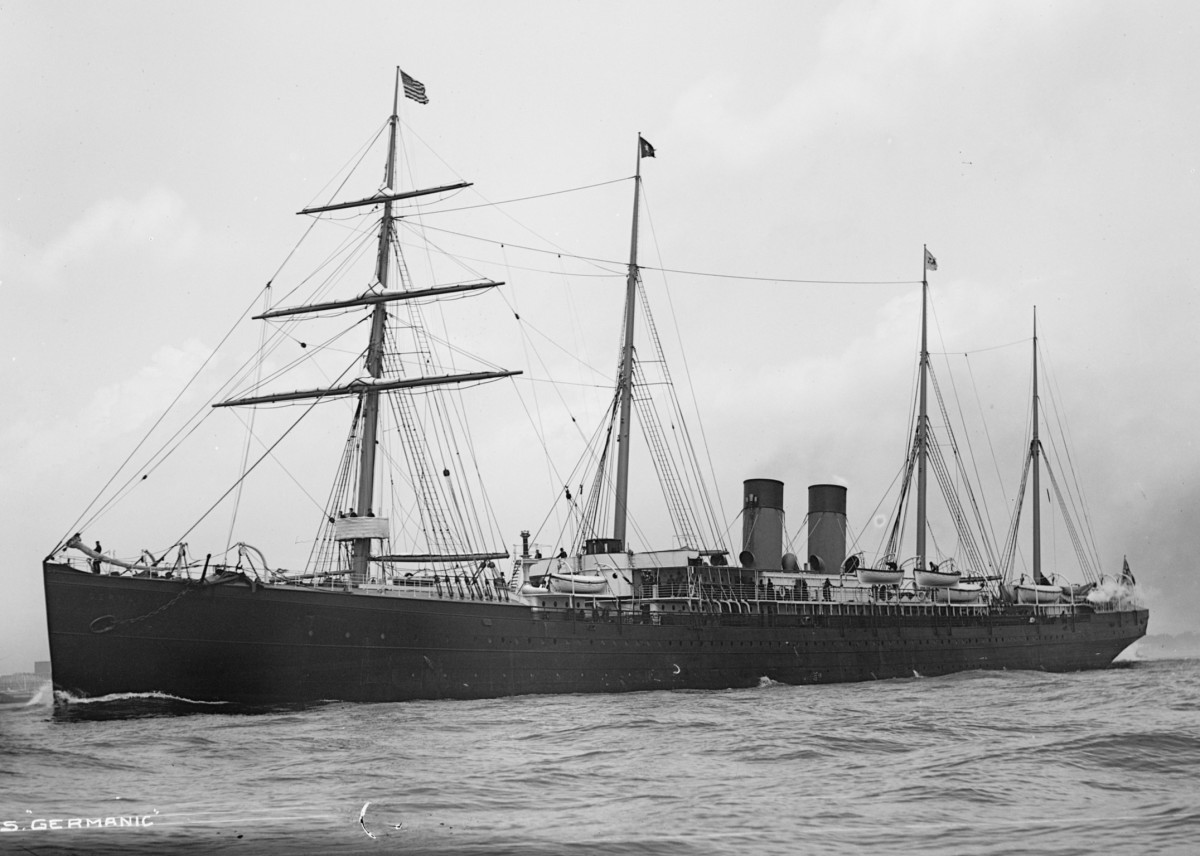Jonathan Swift Turns England on Their Heads
Ireland Bucks Traditional Social Mores'
Satire is a timeless genre in literature. It is a powerful device to voice social injustices, economic disparity, and hypocrisy. Jonathan Swift’s "A Modest Proposal" employs all three of these aspects of satire stated in revealing how British society has affected the standard of living in Ireland.
The pamphlet is an acidic analysis of how impoverished families in Ireland are perceived by those in England as having animal-like qualities. Although intended to invoke irony, the pamphlet is a brutally honest, sarcastic depiction of English behavior. This is a clever device used by Swift to ensure each example of the story can be portrayed clearly.
Hide the Kids... Better Yet- Eat Them

The first section of the pamphlet is Swift’s character descriptions of needy women in Ireland begging for “sustenance for their helpless infants” (Swift 2462) and how his plan will prevent “voluntary abortions” (Swift 2463) and “sacrificing poor innocent babes” (Swift 2463).
As the pamphlet continues however, the author envisions members of his own country being fed to England “whether stewed, baked or broiled” (Swift 2464). Swift shows no mercy. He even goes to the extreme by suggesting that the English are cannibals: “Infant’s flesh will be in season throughout the year, but more plentiful in March” (Swift 2464).
Swift also draws a parallel between the capitalistic nature of both England and America, having been “assured by a very knowing American of my acquaintance in London” (Swift 2464). The American he speaks of also has a taste for human flesh, evidenced by the fact that when the author spoke of him, the American concluded that “from frequent experience, (male’s) flesh was generally tough” (Swift 2464) and had a “disagreeable taste” (Swift 2465).
The absurd idea of the Irish selling their own children for food to the British reflects on how drastically deprived the Irish were and how savage the British were. The pamphlet is an example of behavior exaggerated to an extreme and is powerful because it deals with more emotion than fact.
Poll
Who is your favorite Irish author?
It's Funny Because it's True
The way in which Swift describes the means of preparing the Irish kids to eat by overfeeding them “so as to render them plump and fat for a good table” (Swift 2464) is a reflection of how utterly disillusioned the author has become with England. Through the text, Swift is quick to criticize the citizens of England as “Cannibals”-- that is- savage imperialists.
In Swift’s view, the economic disparity between England and Ireland is evidenced by the fact that the English landlords “have already devoured most of the (Irish) parents” (Swift 2464) and because of the English power, are entitled to consume Irish children.
The practice of selling Irish children to England will make England become “good landlords” (Swift 2465). By no means does the pamphlet attempt to provide a logical solution to Ireland’s cultural, economic or religious ills. The satire is especially biting because wealthy English had no reason to add Irish children to their meals.
Devil in the Details

The Origins of Dry Humor
What makes the satire so powerful is how blunt the author’s tone is. Using demographics and detailed information as to how this plan should be carried out, it is funny because it appears so serious.
Swift’s humor is masked in a dry boring academic paper. Dublin is where the main “shambles” (Swift 2465) should take place. The idea is so absurd yet so coldly thought out and explained that one cannot help but laugh at the irony.
Swift is confident about how this plan will help all involved. First, it will eliminate Papists, who to Swift are the “Principle breeders” and Ireland’s most “Dangerous enemies” (Swift 2466). This idea is an attack on those who did not support Ireland’s Catholicism, but rather felt that Protestantism is the true religion.
The story is also a reflection of 18th century British colonization because England, at one time, had a vision of being the dominating global power in the world.
In addition to eliminating religious strife, Swift’s plan would finally put money in the pockets of some of Ireland’s most deprived people. In his mind, the only way this can happen is through cannibalism.
Sadness Through Humor
Though intended to be humorous, ultimately the pamphlet is a sad reminder of how intolerance and feelings of superiority result in inhumane behavior.
Satire is used to cover up bitterness towards unfair racism against other countries. The bulk of Swift's writing in this story is alliteration to how the enormous conflicts in our world ultimately lead to our identities. The origin of these conflicts however, is based in our own stubbornness in petty disagreements.
Swift's accounts may be somewhat hard to believe due to the bizarre nature of what he has encountered through British colonization, so he embellishes the social mores of the English to that of cannibals. He is wearing the mask of a serious scholar in his writing, though the pamphlet is quite effective in revealing how the entitled English perceived Ireland.








